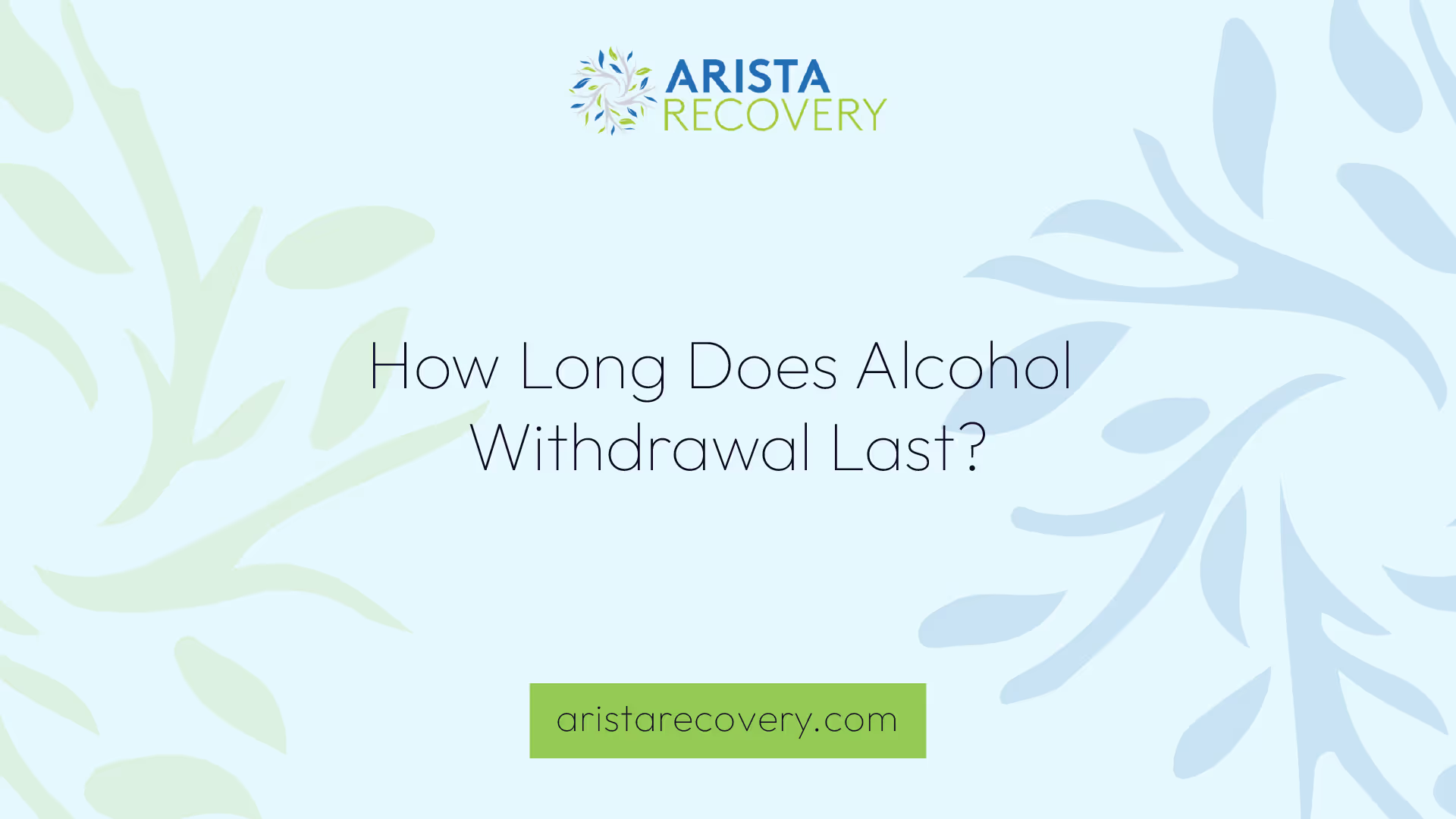How Long Does Alcohol Withdrawal Last?

Alcohol use disorder is defined as someone who is unable to stop drinking, even when it begins to negatively affect their health and relationships. They also have built a tolerance to the substance and must drink more in order to achieve the same effect. When a person has developed alcohol use disorder, they have intense cravings for alcohol and find it difficult to think about other things. If you find yourself in these circumstances, you may require alcohol rehab in order to stop drinking.
When you attempt to detox from alcohol, you will probably experience symptoms of alcohol withdrawal. Alcohol withdrawal symptoms can be dangerous and even life-threatening, so it’s an important step to go to a treatment center if you are struggling with alcoholism. If you have developed severe alcohol dependence you may suffer from alcohol withdrawal syndrome, which is a combination of physical, mental, and emotional symptoms that occur when the patient stops drinking.
Since some symptoms can linger for a few weeks, medical detox at a rehab center will typically last about 3 to 14 days to assure that when recovery programs begin, the worst of the withdrawal symptoms have subsided.

Psychological symptoms include:
- Depression and anxiety
- Paranoia
- Insomnia
- Panic attacks
- Intense drug cravings
- Short-term memory loss
- Delirium tremens
Physical symptoms include:
- Nausea and vomiting
- Diarrhea
- Fatigue
- Fever and chills
- Seizures
- Excessive sweating and shaking
- Heart palpitations
The timeline for alcohol detox symptoms begins between 4 to 12 hours after the last drink of alcohol. These withdrawal symptoms will reach their height of intensity during the first 24 to 72 hours, with the worst occurring about 2 days after the patient has quit their alcohol consumption. For patients who experience delirium tremens (DTs), a highly intense and dangerous symptom of alcohol withdrawal, these symptoms will typically begin about 48-72 hours after heavy drinking has stopped.
Delirium tremens is a severe symptom that occurs in about 2% of people with alcohol use disorder. Delirium tremens include the severe symptoms of alcohol withdrawal that are listed below, as well as a change in mental status, sudden lack of awareness of their environment and reality, high fever, extreme confusion, and uncontrollable shaking.
Delirium tremens may also result in further medical complications such as cardiac arrhythmia, respiratory arrest, over sedation, or aspiration pneumonitis. These conditions all have the potential to be fatal—or to cause serious infections. People are at a greater risk of developing delirium tremens if they are middle-aged or elderly, have experienced seizures during previous withdrawals, have a mental illness, have abnormal liver function, or have abused alcohol over a long period of time.
Symptoms of alcohol withdrawal will usually last for 3-4 days, although sometimes they may last up to 8 days. Most withdrawal symptoms will fade during day 4 or 5, although in cases of severe alcohol dependence, these symptoms can linger for a few weeks. The symptoms that patients experience will vary based on which stage of withdrawal they are currently in.
Factors that can also affect the severity and length of alcohol withdrawal symptoms include an individual’s gender, weight, and age, the length of their alcohol use, the severity of their alcohol use, their overall mental and physical health, whether or not they have a family history of alcoholism, whether or not alcohol has been combined with other drugs, and whether or not they have experienced alcohol withdrawal in the past. Although these factors can change how a person experiences alcohol withdrawal, they can typically expect to experience a timeline similar to this.
In the first 8 hours of withdrawal, patients will experience mild symptoms such as restlessness, irritability, nervousness, pale or clammy skin, loss of appetite, nausea, and slight shakiness. Once they have reached hours 12-24, symptoms will become more noticeable and intense. These symptoms include depression, mood swings, night sweats, nightmares, headaches or migraines, insomnia or difficulty sleeping, and vomiting. In the 24 to 72 hour period, when withdrawal symptoms are peaking, individuals may experience severe symptoms such as nausea and vomiting, agitation, tremors, seizures, and hallucinations.
In the weeks following, it is rare yet possible that a person may experience persistent symptoms such as sleep disturbances, fatigue, and mood changes that can last up to months. However, after the time period of 3-5 days, the majority of symptoms will usually be alleviated, and this is when the recovery treatment can begin. During this treatment, Arista Recovery will help patients address the issues that led to their alcohol use disorder and work with them to develop healthier coping mechanisms that reduces the risk of relapse and facilitates long term sobriety.
You’re not alone in this.
When mental health challenges and addiction intersect, it can feel isolating. At Arista, we offer compassionate, evidence-based, and trauma-informed care to help you heal, grow, and move forward.
You’re not alone in this.
When mental health challenges and addiction intersect, it can feel isolating. At Arista, we offer compassionate, evidence-based, and trauma-informed care to help you heal, grow, and move forward.
Support that moves with you.
You’ve taken a brave first step. At Arista Recovery, we’re here to help you continue with best-in-class care designed for long-term healing and support.
.webp)






